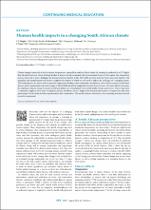JavaScript is disabled for your browser. Some features of this site may not work without it.
- ResearchSpace
- →
- Research Publications/Outputs
- →
- Journal Articles
- →
- View Item
| dc.contributor.author |
Wright, CY

|
|
| dc.contributor.author |
Garland, Rebecca M

|
|
| dc.contributor.author |
Norval, M

|
|
| dc.contributor.author |
Vogel, C

|
|
| dc.date.accessioned | 2014-09-30T13:12:09Z | |
| dc.date.available | 2014-09-30T13:12:09Z | |
| dc.date.issued | 2014-08 | |
| dc.identifier.citation | Wright, C.Y., Garland, R.M., Norval, M. and Vogel, C. 2014. Human health impacts in a changing South African climate. South African Medical Journal, vol. 104(8), pp 579-582 | en_US |
| dc.identifier.issn | 0256-9574 | |
| dc.identifier.uri | http://hdl.handle.net/10204/7690 | |
| dc.description | Copyright: 2014 Health and Medical Publishing Group (HMPG). This journal authorizes the publication of the information herewith contained. Published in South African Medical Journal, vol. 104(8), pp 579-582 | en_US |
| dc.description.abstract | Climate change is projected to lead to warmer temperatures, especially in southern Africa, where the warming is predicted to be 2°C higher than the global increase. Given the high burden of disease already associated with environmental factors in this region, this temperature increase may lead to grave challenges for human health and quality of life. HIV/AIDS, poverty, food and water insecurity together with inequality and unemployment will further complicate the manner in which we will need to address the challenges of a changing climate. The health impacts are direct, such as increased temperatures leading to heat exhaustion, and indirect, such as likely increases in infectious diseases from contaminated water and changes in the distribution and/or magnitude of vector-borne diseases. The most effective measures for adapting to climate change to ensure healthy populations are to implement basic public health systems and services. These range from a continuous supply of clean water to adequate primary healthcare services. Support for required interventions is required not only from government, but also from healthcare professionals and communities. The need for disease surveillance, data capturing and more focused research is paramount. | en_US |
| dc.language.iso | en | en_US |
| dc.publisher | Health and Medical Publishing Group (HMPG) | en_US |
| dc.relation.ispartofseries | Workflow;13350 | |
| dc.subject | Human health | en_US |
| dc.subject | Climate change impacts | en_US |
| dc.subject | Public health systems | en_US |
| dc.subject | Disease surveillance | en_US |
| dc.title | Human health impacts in a changing South African climate | en_US |
| dc.type | Article | en_US |
| dc.identifier.apacitation | Wright, C., Garland, R. M., Norval, M., & Vogel, C. (2014). Human health impacts in a changing South African climate. http://hdl.handle.net/10204/7690 | en_ZA |
| dc.identifier.chicagocitation | Wright, CY, Rebecca M Garland, M Norval, and C Vogel "Human health impacts in a changing South African climate." (2014) http://hdl.handle.net/10204/7690 | en_ZA |
| dc.identifier.vancouvercitation | Wright C, Garland RM, Norval M, Vogel C. Human health impacts in a changing South African climate. 2014; http://hdl.handle.net/10204/7690. | en_ZA |
| dc.identifier.ris | TY - Article AU - Wright, CY AU - Garland, Rebecca M AU - Norval, M AU - Vogel, C AB - Climate change is projected to lead to warmer temperatures, especially in southern Africa, where the warming is predicted to be 2°C higher than the global increase. Given the high burden of disease already associated with environmental factors in this region, this temperature increase may lead to grave challenges for human health and quality of life. HIV/AIDS, poverty, food and water insecurity together with inequality and unemployment will further complicate the manner in which we will need to address the challenges of a changing climate. The health impacts are direct, such as increased temperatures leading to heat exhaustion, and indirect, such as likely increases in infectious diseases from contaminated water and changes in the distribution and/or magnitude of vector-borne diseases. The most effective measures for adapting to climate change to ensure healthy populations are to implement basic public health systems and services. These range from a continuous supply of clean water to adequate primary healthcare services. Support for required interventions is required not only from government, but also from healthcare professionals and communities. The need for disease surveillance, data capturing and more focused research is paramount. DA - 2014-08 DB - ResearchSpace DP - CSIR KW - Human health KW - Climate change impacts KW - Public health systems KW - Disease surveillance LK - https://researchspace.csir.co.za PY - 2014 SM - 0256-9574 T1 - Human health impacts in a changing South African climate TI - Human health impacts in a changing South African climate UR - http://hdl.handle.net/10204/7690 ER - | en_ZA |






